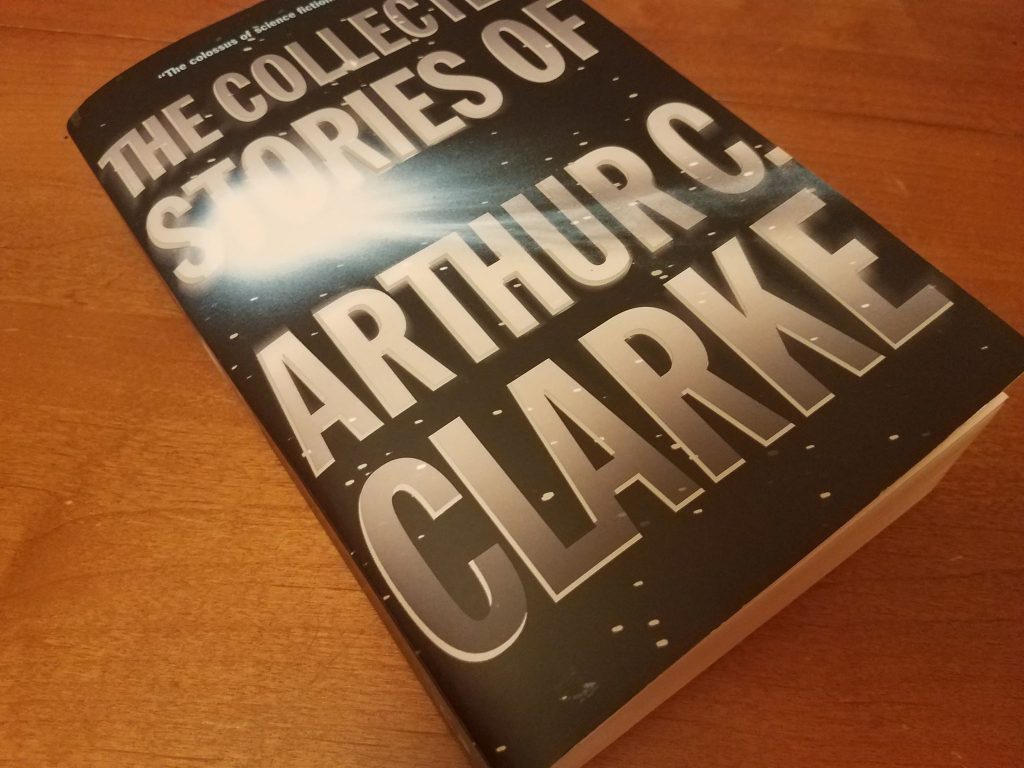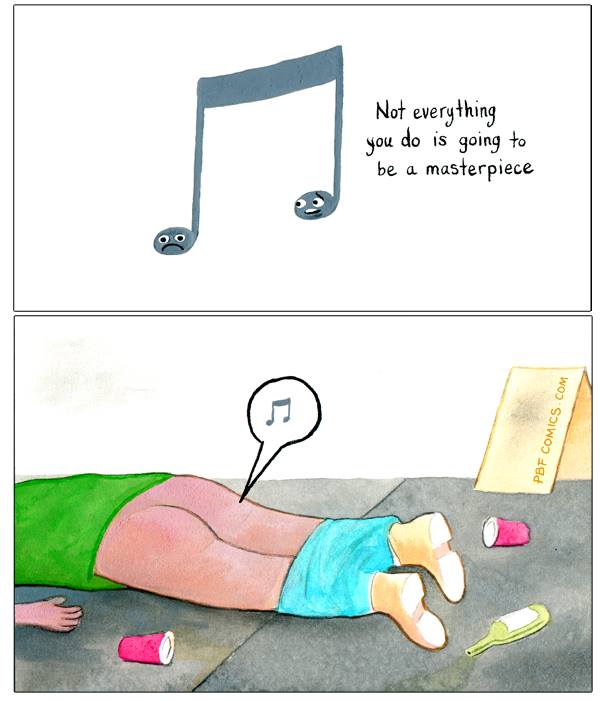
It feels strange and somewhat magical to hold such a large sample of a person’s life’s work in my hands. The Collected Stories of Arthur C. Clarke (spanning 966 pages on paperback or a little over 51 hours in audio book form) contains all but one of his published short stories, over 100 tales written by a man who I am sad to say I wasn’t even aware of until after his passing in 2008**. It reads like a resolution one might be presented with upon retirement; it is an account of Arthur C. Clarke’s many accomplishments in a genre that he is considered to be a parent of—one of the “big three” of science fiction, along with Heinlein and Asimov (two other authors whose work, by the way, I’ve not read a single word of).
Because this tome of science fiction orders its stories chronologically (the first, “Travel by Wire,” was published in 1937, when ACC was 20 years old; the last, “Improving the Neighborhood,” was published in 1999, when ACC was 82), I was also treated to the longer story—the story between the lines.
The book tells the story of a young science fiction writer from the United Kingdom who based most of his work in the UK but gradually shifted settings to the United States following the establishment of NASA in 1958, and then to other parts of the world later like Africa and Australia and Russia; the story of a man who evolved decade over decade from whacky, off-the-wall nonsense to hard science fiction, and then reached middle age and briefly shifted his focus to silly tales narrated by drunks in a pub (tales reminiscent of Little Shop of Horrors and other shorts that would be right at home in an episode of Futurama); and sadly, this book is also the story of a dying medium. See, the majority of these tales take place in those super retro-looking magazines with titles like “Weird Tales” and “Thrilling Wonder Stories.” But through the decades, as these publications shuttered, it was just as likely to see later short stories appearing in magazines such as “Boy’s Life,” “Nature,” and believe it or not, “Playboy.”
Though the subject matter varies greatly, most of these tales (which range from 31 words to 18,000) had a similar setup of a long preamble followed by a swift punchline. (I had to Google the definition to make sure, but “punchline” doesn’t necessarily relate to humor, and many of these stories are very serious in tone.) Some of these punchlines added nothing to the story, as was the case in “Rescue Party.” Others, like the sad crisis of faith at the heart of “The Star,” truly shook me.
It’s remarkable how many of these short stories were later expanded into full novels. “Encounter in the Dawn” and “The Sentinel” were part of 2001: A Space Odyssey; “Guardian Angel” was later expanded into the phenomenal Childhood’s End; the ‘simps’ from “An Ape About the House” and “A Meeting With Medusa” made an appearance in Rendezvous With Rama; “The Songs of Distant Earth” and “The Hammer of God” each went on to be expanded into a novels of the same name.
Even more remarkable is how often these expanded stories took a sharp turn from their source material. The punchline in “Guardian Angel,” for example, was that our xenophobia—our distrust of what we could not see—drove our alien visitors away. In Childhood’s End, this climactic scene played out as if in an alternate universe; our xenophobia was taken in stride, and the aliens later did reveal themselves to humanity. And “The Songs of Distant Earth,” from what I hear, bears almost no resemblance to its longer sibling.
(There may be more, honestly, but I have only read two of Arthur C. Clarke’s 22 novels.)
The oldest of these short stories are incredibly readable today, 82 years later. I can’t say the same for some books written a decade ago by other authors. That said, and while I enjoyed reading many of these shorts on paper, I would not have been able to get through this book if it wasn’t for the audio version (which I feel almost guilty admitting I bought for $5 during an Audible sale). There’s a lot of dry exposition to get through in some stories. And during some lengthy explanation about the vacuum of space, I was thankful that the sultry voice of Ray Porter was there to plow through it. And in some cases, like “The Lion of Comarre” and “The Road to the Sea,” I still ended up skipping partway through because they just weren’t that great.
I was able to spread this book out for a little over a year, listening to one or two or several stories between other books. Sometimes I’d listen to a dozen in a row, and other times I’d go two or three months without touching it. (There were over 100 stories; I didn’t want to overdo it.)
Below are all of the stories in this book, separated with a line by decade. Clearly, he was in his prime in the 40s, 50s, and 60s. Every story with an asterisk next to it was a favorite of mine—these are, in my opinion, the very best of what this book has to offer. I think he was at his best when he was going for laughs (“Trouble With the Natives” had me in stiches), for tragedy (see “Breaking Strain” and “The Star”), and when he was speculating about alien worlds. This man had such an incredible imagination. From the would-be saviors of “Rescue Party,” to the unfortunate victims of “The Star,” to the colossal creatures of “A Meeting With Medusa,” ACC was on fire when he was just making stuff up.
The rest of the short stories were merely great or very funny, with the exception of a few duds like “Whacky,” “Silence Please,” and “Refugee.” But I certainly didn’t expect every word in this collection to be gold.

I also indicate below which short stories were “Tales from The White Hart,” because they were such a departure from his usual hard science fiction, replaced by goofy nonsense about killer plants, death rays, and a cure for sleep. These were all told by one of ACC’s most developed characters, Harry Purvis, who has a reputation for stretching the truth and gets free drinks.
His portrayal of women throughout this tome might be problematic for today’s readers, but it’s not terrible (in my opinion). The worst offenders are 1954’s “Patent Pending,” where a virtual reality machine that can simulate food and sex is casually joked to have removed the need for women; 1957’s “Let There Be Light,” where a man plots to kill his wife, but upon discovering he accidently killed her lover by mistake instead, goes insane with guilt; and 1964’s “The Food of the Gods,” where a man addressing the senate in the far, far, far, far, far-flung future refers to the entire senate as “gentlemen.” The rest of the time, women have bit parts or are simply absent.
Despite these minor complaints, this is one of the best books I have ever had the pleasure of reading. I laughed, I literally cried, I became attached to certain characters, and so many times gasped at the punchline. Even having read it already, this would still be my desert island book for the sheer variety in subject matter. A beautiful collection of work from a man I can definitely call one of my favorite authors.
**When I say I was unfamiliar with him, I do not include 2001: A Space Odyssey. I had seen that movie a dozen times by then, but I thought it was strictly a Stanley Kubrick joint.
*Travel by Wire! – 1937
How We Went to Mars – 1938
Retreat From Earth – 1938
*Reverie – 1939
—————————
The Awakening – 1942
Whacky – 1942
Loophole – 1946
*Rescue Party – 1946
Technical Error – 1946
Castaway – 1947
The Fires Within – 1947
Inheritance – 1947
Nightfall – 1947
History Lesson – 1949
Transience – 1949
The Wall of Darkness – 1949
DNF – The Lion of Comarre – 1949
The Forgotten Enemy – 1949
Hide-and-Seek – 1949
*Breaking Strain – 1949
—————————
*Nemesis – 1950
*Guardian Angel – 1950
Time’s Arrow – 1950
A Walk in the Dark – 1950
Silence Please – 1950
*Trouble With the Natives – 1951
DNF – The Road to the Sea – 1951
*The Sentinel – 1951
Holiday on the Moon – 19
Earthlight – 1951
Second Dawn – 1951
Superiority – 1951
‘If I Forget Thee, Oh Earth…’ – 1951
All the Time in the World – 1951
The Nine Billion Names of God – 1953
The Possessed – 1953
The Parasite – 1953
*Jupiter Five – 1953
*Encounter In the Dawn – 1953
The Other Tiger – 1953
Publicity Campaign – 1953
*Armaments Race – 1954
The Deep Range – 1954
No Morning After – 1954
Tales from the White Hart – Big Game Hunt – 1956
Tales from the White Hart – Patent Pending – 1954
Refugee – 1955
*The Star – 1955
Tales from the White Hart – What Goes Up – 1956
Venture to the Moon – 1956
Tales from the White Hart – The Pacifist – 1956
Tales from the White Hart – The Reluctant Orchid – 1956
Tales from the White Hart – Moving Spirit – ????
Tales from the White Hart – The Defenestration of Ermintrude Inch – ????
Tales from the White Hart – The Ultimate Melody – 1957
Tales from the White Hart – The Next Tenants – 1957
Tales from the White Hart – Cold War – 1957
Tales from the White Hart – Sleeping Beauty – 1957
Tales from the White Hart – Security Check – 1957
Tales from the White Hart – The Man Who Ploughed the Sea – 1957
Tales from the White Hart – Critical Mass – 1957
The Other Side of the Sky – 1957
Tales from the White Hart – Let There Be Light – 1957
Out of the Sun – 1958
*Cosmic Casanova – 1958
The Songs of Distant Earth – 1958
A Slight Case of Sunstroke – 1958
Who’s There? – 1958
Out of the Cradle, Endlessly Orbiting… – 1959
—————————
I Remember Babylon – 1960
Trouble With Time – 1960
Into the Comet – 1960
Summertime on Icarus – 1960
Saturn Rising – 1961
*Death and the Senator – 1961
*Before Eden – 1961
*Hate – 1961
Love that Universe – 1961
Dog Star – 1962
Maelstrom II – 1962
An Ape About the House – 1962
The Shining Ones – 1962
The Secret – 1963
Dial F For Frankenstein – 1964
*The Wind from the Sun – 1964
The Food of the Gods – 1964
The Last Command – 1965
Light of Darkness – 1966
The Longest Science-fiction Story Ever Told – 1966
Playback – 1956
The Cruel Sky – 1967
Herbert George Morley Roberts Wells, Esq. – 1967
Crusade – 1968
—————————
Neutron Tide – 1970
Reunions – 1971
Transit of Earth – 1971
*A Meeting With Medusa – 1971
Quarantine – 1977
—————————
‘siseneG’ – 1984
The Steam-powered Word Processor – 1986
On Golden Seas – 1986
—————————
The Hammer of God – 1992
The Wire Continuum – 1998
Improving the Neighbourhood – 1999
